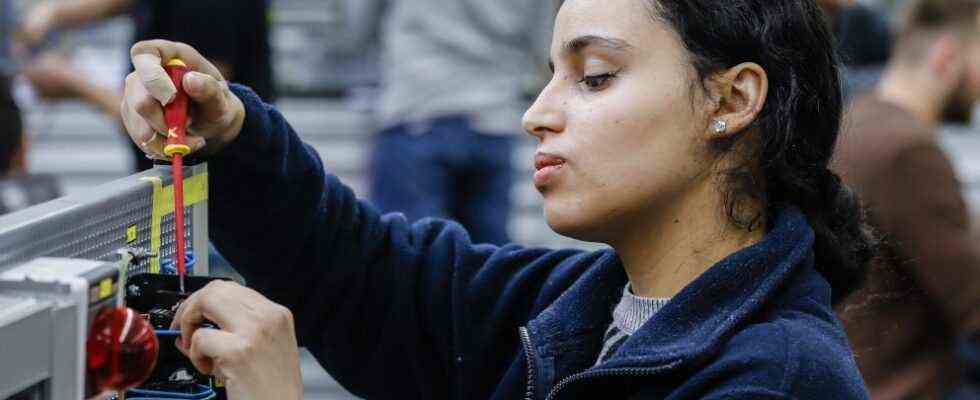The general meeting of Südwestmetall was almost over, star guest Armin Laschet had long since passed. Finger food and white wine were tempting in front of the hall, but Stefan Wolf did not let those present out yet. In mid-July, the President of the Metal Employers addressed the assembled entrepreneurs emotionally: “If we start saving on the training of young people, it will hurt. I appeal to you to keep the training positions or maybe to increase them by two or three. You will not regret!”
The Corona crisis caused a unique decline: in 2020, more than nine percent fewer training contracts were concluded, that is almost 48,000 contracts, reports the Federal Statistical Office. There has never been a drop like this since the data was collected in 1977.
The companies are also bidding for the new year of training 14,000 fewer apprenticeships to date than in the previous year. Hairdressers, hotels or shops that have been closed for months are holding back. Overall, however, it sounds like a warning signal: is the crisis leaving young people without training and a shortage of skilled workers?
Customers are finally coming back: a trainee in a Hamburg barber shop.
(Photo: Christian Charisius / dpa)
Anyone who listens to the head of the Federal Employment Agency quickly realizes that the problem has several facets. At the beginning of July, Detlef Scheele appealed to school leavers to look for an apprenticeship instead of heading for a bridging year as a preventive measure. There is a shortage of applicants even more than there are places: 35,000 fewer have registered since October than a year earlier. Bavarian metal employers register far more vacancies than candidates. “It is a real market for applicants, despite Corona,” says managing director Bertram Brossardt.
Fewer applicants? Friedrich Hubert Esser sees several reasons for this. During the lockdown, there was less personal advice in schools and job agencies, fewer training fairs and internships, reports the President of the Federal Institute for Vocational Education and Training (BIBB). As a result, some school leavers do not see their opportunities. “And the young people, like their parents, are insecure because of the Corona crisis: How safe is such an apprenticeship?”
Manuela Conte, youth secretary of the German Trade Union Federation, not only calls on companies to register vacancies. She also addresses school leavers: “Find out more from employment agencies, online job exchanges or companies in the neighborhood – despite Corona, many companies are training.”
When the head of the job agency, Detlef Scheele, took another look at the training figures at the end of July, the situation had improved: 30,000 fewer unsupported applicants than a month earlier. But there are still 130,000 young citizens looking. Scheele also hopes that corona scars can largely be avoided during training. He knows from experience that a lot happens in August and September. Companies are still hiring, young people can still find something. It will also depend on whether the fourth wave of pandemics brings new restrictions that hit restaurants and other educators.
A photo from pre-Corona times: You can’t keep a distance of 1.5 meters when you saw together.
(Photo: Imago)
The risk remains that the Corona crisis will further weaken dual training, which has been attacked by two trends for a long time: The population is shrinking and the tendency is increasing to study rather than do an apprenticeship. “The demographics are striking, that is becoming more visible every year,” observes Bertram Brossardt from the Bavarian metalworking industry. “And more and more students are studying or going to technical schools, for example for nursing.” These trends would have disadvantages for the German economy, “because industrial manufacturing expertise and craftsmanship are among our strengths,” he says. “Without strong dual training, our location will be weaker.”
In the fight against climate change, Germany needs well-trained plant mechanics
While some professions are overcrowded, the shortage is clear in others: in 2020, almost every second apprenticeship position offered for butchers and food retailers remained vacant. Companies also often looked in vain for plumbers, concrete workers or restaurant specialists.
A shortage of skilled workers has consequences that have so far often been overlooked, warns Esser from the Federal Institute for Vocational Training. For example, for climate protection. “In the future, system mechanics will not only be responsible for furnishing bathrooms, but also for making the house energy-friendly,” he says. “But high school students do not feel addressed by such a profession. And secondary school students are more difficult to train in it because the demands have increased so much.”
Esser calls for more appreciation for apprenticeships so that Germans rethink. As in Austria or Switzerland, he wants to legally stipulate that a master’s qualification is equivalent to a bachelor’s degree. Anyone who goes into business for themselves after completing their training will encounter too much bureaucracy as an entrepreneur. And small businesses need more support in offering apprenticeships.
The Bavarian metal employer Bertram Brossardt wants to upgrade the training with additional modules in order to make it more attractive for high-performing young people who might otherwise aspire to the university. At the same time, he suggests better opportunities for underperforming young people and refugees and more opportunities for people with disabilities to participate. He also looks to the future: “The most important thing is to ensure the high quality of training. Professions need to be further developed and restructured.”
Despite all the challenges, Brossardt also has positive news. Next year he expects three percent more apprenticeship contracts in his industries. He can reassure school leavers who are concerned about the safety of an apprenticeship: This year 90 percent of the companies had a job for their apprentices after their apprenticeship – in the middle of the Corona crisis.

